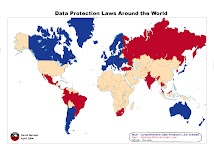It is not unusual at all for a job applicant to blag their way in an interview hoping that they will eventually learn the ropes and not get cought. Sometimes it works, other times it can blow up in their face. Below is an interesting article from the Guardian which highlights how an employer can get cought out if their referencing process is not up to scratch...
___________________________________________________
guardian.co.uk, Wednesday 24 June 2009 10.37
by Harriet Marsh
Nick is a teacher at an English language school in Tokyo. Nick is also deceiving his employers. On his arrival in Japan eight years ago he obtained what he expected to be a temporary job teaching English by claiming he had a degree from Oxford University. He backed up the claim with a false degree certificate obtained in Bangkok.
In reality Nick has one A level and no degree. He fabricated a university career because he felt that it would dramatically increase his chances of employment. He was right and Nick has no plans to return to the UK. Backed by his bogus qualification he is now, after eight years, the longest serving foreign teacher in his school.
Yet he admits it can be hard to live the lie. "Several years ago the school hand-picked me to accompany a group of students to Oxford on the basis that I knew the city well because I had spent three years studying there. In reality I had been there once for the weekend to visit some friends. Yet I had to maintain the charade: to come clean now would be unthinkable," he says.
Getting a job can be highly stressful and candidates feel pressure to enhance their achievements to present themselves in the most favourable light.
In their book Deception in Selection, Liz Walley and Mike Smith suggest that, in such circumstances, people are pushed to deception in the belief that "everyone else is doing it".
Certainly lying on CVs is on the increase. Surveys suggest as many as a quarter of job seekers deviate from the truth on their CV. The common distortions include bogus or exaggerated qualifications, changing the dates of employment to hide career gaps and exaggerating the pay received in a previous job.
Every job-hunter faces the challenge of presenting their qualifications and past experience with as positive a gloss as possible. So just where does harmless exaggeration end and outright deception begin? It is a difficult question to answer, just as it is hard to define what are company perks and what is simple theft.
While exaggeration is widespread and generally accepted, it is unwise to resort to outright lies. This is not merely moral advice, it is also expedient. Outright lies such as qualifications or invented jobs will work against you.
At best, the cost of lying to future employers is the embarrassment of being found out. At worst, it can cost you the job. Under the terms of the contract of employment, prospective employees are required to tell the truth.
A CV acts as a personal history form and if a job offer is made on the basis of information contained in a CV that the employer believes to be correct, then the employer is legally entitled to withdraw the job offer if they discover the CV contains false information.
Take the example of a young man recently employed by a major household goods manufacturing company, who discovered this the hard way.
He joined the company claiming his previous salary to be 25% higher than it actually was. Yet when the payroll system processed the tax details from his former employer the deceit was uncovered. Four hours after arriving at his desk he was marched from the building.
In Deception in Selection, Walley and Smith put forward the theory that job candidates often fabricate an element of their CV in the belief that it will only be a short-term measure. Yet, if not discovered early on, they find it hard to turn back the clock and escape their deception.
Wednesday, 14 April 2010
Deception in Selection - CV lies
Labels:
bogus cvs,
common cv lies,
cv discrepancies,
cv fraud,
lying on cvs
Subscribe to:
Post Comments (Atom)




3 comments:
pre employment screening is the process of thoroughly verifying the educational and professional qualifications and employment history of a job applicant and conducting a search of appropriate public records in order to ascertain any information which is relevant to his or her application. The results of the process are drawn from public information sources and are fully documented and auditable.
Here are more info on pre employment screening
Great reading and extremely comprehensive post – pretty much covers everything...
Employment Checks and Screening
Pre Employment Screening
Post a Comment